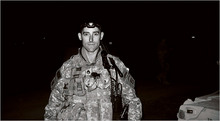 Via Hilzoy, I just learned that soldier-scholar-blogger Andrew Olmsted was killed yesterday in Iraq. According to various reports, including comments on his blog for the Rocky Mountain News, it looks like he was serving as an adviser to the Iraqi Army in Iraq's volatile Diyala province, where he was ambushed and killed. I traded a number of emails with Andrew over the years and thought quite highly of him, and regret that I never had the opportunity to meet him. Now I mourn his loss, and extend my condolences to his family.
Via Hilzoy, I just learned that soldier-scholar-blogger Andrew Olmsted was killed yesterday in Iraq. According to various reports, including comments on his blog for the Rocky Mountain News, it looks like he was serving as an adviser to the Iraqi Army in Iraq's volatile Diyala province, where he was ambushed and killed. I traded a number of emails with Andrew over the years and thought quite highly of him, and regret that I never had the opportunity to meet him. Now I mourn his loss, and extend my condolences to his family.His last blog post, published posthumously, is a powerful and moving essay about personal service and politics. This section stood out to me:
I do ask (not that I'm in a position to enforce this) that no one try to use my death to further their political purposes. I went to Iraq and did what I did for my reasons, not yours. My life isn't a chit to be used to bludgeon people to silence on either side. If you think the U.S. should stay in Iraq, don't drag me into it by claiming that somehow my death demands us staying in Iraq. If you think the U.S. ought to get out tomorrow, don't cite my name as an example of someone's life who was wasted by our mission in Iraq. I have my own opinions about what we should do about Iraq, but since I'm not around to expound on them I'd prefer others not try and use me as some kind of moral capital to support a position I probably didn't support. Further, this is tough enough on my family without their having to see my picture being used in some rally or my name being cited for some political purpose. You can fight political battles without hurting my family, and I'd prefer that you did so.Update I: It appears that MAJ Olmsted was killed during combat operations near Muqdadiyah, a particularly nasty town northeast of Baqubah in the Diyala river valley. According to the AP:
On a similar note, while you're free to think whatever you like about my life and death, if you think I wasted my life, I'll tell you you're wrong. We're all going to die of something. I died doing a job I loved. When your time comes, I hope you are as fortunate as I was.
The U.S. military has stepped up operations against al-Qaida cells and networks north of Baghdad in Diyala province, of which Baqouba is the capital.Update II: The Department of Defense published its official release announcing MAJ Olmsted's death, as well as that of CPT Thomas J. Casey. According to the release: "They died Jan. 3 in As Sadiyah, Iraq, of wounds suffered when insurgents attacked their unit using small arms fire during combat operations." Both men served on a Military Transition Team in the Diyala province of Iraq, meaning that they were advisers to the Iraqi Army. As Sadiyah is located near Muqdadiyah in one of the most violent parts of the Diyala province, a place where Sunni insurgents, Al Qaeda in Iraq fighters, and Shiite militias all fight each other. It has been the site of many recent combat operations. MAJ Olmsted and CPT Casey were serving at the tip of the spear, in one of the most difficult jobs in Iraq, in one of the most turbulent places.
* * *
The cease-fire [with al-Sadr] has allowed the U.S. military to concentrate on pursuing al-Qaida in Iraq, which was pushed out of Anbar province by the Awakening Councils and largely expelled from swaths of Baghdad by the U.S. and Iraqi armies.
The majority of the insurgents are thought to have sought shelter in Diyala province, its northeast Diyala river valley region, and around the town of Muqdadiyah and the northern city of Mosul.
The U.S. military said it killed two insurgents and detained 12 in that area. The operations also resulted in the deaths of two American soldiers and the wounding of another in a small-arms attack Thursday.
0 Trackbacks / 8 Comments
























